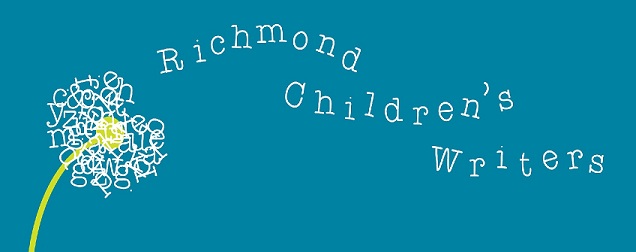
We believe in the indispensable value of good literature in the lives of children. Our mission is to foster the professional development of the creators of children’s literature, promote connections between children’s authors and other members of the literary community, and nurture an environment in which children’s literature can be appreciated by the widest possible audience.
Wednesday, June 10, 2015
Richmond Children's Writers is moving and expanding. We have our own website now! There are many exciting things happening for us, include an anthology. We hope you will follow us at our new website to catch up on the latest posts and news. Please click the link below to find us and continue to follow Richmond Children's Writers.
Thank you so much!
www.RichmondChildrensWriters.com
Monday, May 18, 2015
In just a couple of seconds, you'll be redirected to our new website.
Wednesday, February 11, 2015
A Fly On The Wall
by Lana Krumwiede
People ask me all the time what we do in our writing group, so I thought I'd put together a highlight reel of sorts. This month we had four manuscripts to critique: One picture book, and three chapters from middle grade books. All were very unique and enjoyable.
People ask me all the time what we do in our writing group, so I thought I'd put together a highlight reel of sorts. This month we had four manuscripts to critique: One picture book, and three chapters from middle grade books. All were very unique and enjoyable.
The first manuscript we read was a beautifully written chapter from a middle-grade novel, or perhaps a chapter book. The language was gorgeous and quirky at the same time.The visual images were absolutely luscious! This story reminded us of Alice and Wonderland
or The Tale of Despereaux. Most of
our suggestions were about small things that we found confusing and ideas for
more character development.
 Everyone loved the picture book manuscript that was
submitted this month. It was very funny and age-appropriate. One of the things
we all commented on were the sounds the author used. They were written out in
very humorous ways that will make the book a fun read aloud. There was a lot to
love about this book—the character was endearing and the action was paced well. One of the suggestions had to do with consistency. Some of the
animals were real and some of them were fantastical; we wondered if it would be
stronger to have all fantastical animals. Another suggestion was to vary the
settings of each scene. Instead of having them all take place on the beach, one
could take place in a forest, another in a cave, and so on, which would
heighten the visual interest of the story.
Everyone loved the picture book manuscript that was
submitted this month. It was very funny and age-appropriate. One of the things
we all commented on were the sounds the author used. They were written out in
very humorous ways that will make the book a fun read aloud. There was a lot to
love about this book—the character was endearing and the action was paced well. One of the suggestions had to do with consistency. Some of the
animals were real and some of them were fantastical; we wondered if it would be
stronger to have all fantastical animals. Another suggestion was to vary the
settings of each scene. Instead of having them all take place on the beach, one
could take place in a forest, another in a cave, and so on, which would
heighten the visual interest of the story.
Next on the docket was an opening chapter from a
middle-grade mystery. The writing flowed well and the narrative was clear—that
alone is a major accomplishment for any writer! The suggestions were primarily
about how to ratchet up the tension and end the first chapter on a suspenseful
note. This is an important point: Getting the tension right is often a second-draft task. In the throes of the
first draft, writers often sense that the tension is not quite adequate. Tell
yourself it’s okay and don’t let it stop you from completing the first draft.
Once you’ve got everything out on the table, it’s much easier to sense where
the tension needs to be and recognize what you, the author, can utilize as a
source of suspense.
The last critique of the night was a chapter from a
middle-grade historical novel. It was an action-packed chapter that everyone
seemed to enjoy. The author had originally written it in third person, then
switched it to first person. There were still a few pesky third-person pronouns
that had cleverly avoided detection, which made it confusing to read (but an easy fix
for the writer). The other comments had to do with character motivations and
making them crystal clear. Not easy to do but very important!
Thanks to all the RCW members for a great February Meeting!
See you in March.
Monday, January 12, 2015
Book Review: Animalium
by Jenny Broom
Illustrations by Kate Scott
Illustrations by Kate Scott
What
is it: a picture book, textbook, coffee table book, reference book or living
history museum? Using a bit of each of these elements, Broom and Scott have put
together a book that explains evolution from the opening galleries of insects
and invertebrates to the closing exhibits of large mammals. Beginning with a
tree of life, an illustration covering two pages, they show how different
groups of animals are related and how the animals have evolved from one
another. Each chapter represents a different museum gallery, each focusing on
one class of animal. Members of each class are described on two-page spreads,
text on the left with the plate of illustrations on the right. A key to the
plate, giving additional information about the animal depicted, is provided
under the text and is linked by number to the illustration. The illustrations
are pen and ink, with color added digitally, a beautiful blend of traditional
and modern illustrative techniques. This choice of media and the arrangement of
images on the plate make reference to established approaches to scientific
illustration and the color reinforces the impression of form and liveliness on
the page. Broom ends her book with an index, a bio of each “curator” and a list
of reference materials labeled “To Learn More.” From Candlewick Press/Big
Picture Press (2012), Ages 8 to 12, ISBN: 978-0-7636-7508-0. Reviewed by Hazel Buys.
Monday, January 5, 2015
Heard of banned books? How about banned words?
‘Bae,’
‘Foodie’ and ‘Enhanced Interrogation’ on List of ‘Banished’ Words for 2015
Thank you to SUZAN CLARKE - from the Jan. 1, 2015 broadcast of
Good Morning America
‘Bae,’ ‘Foodie’ and ‘Enhanced Interrogation’ on List of ‘Banished’ Words for 2015 (ABC News)
Do you grimace when you hear some call a significant other
“bae,” or throw out the word “takeaway” in a meeting? Do you gnash your teeth
when someone describes himself or herself as a “foodie” or take credit for
“curating” something that’s not in a museum?
You’re not alone.
Those are offenders that have made the list of 12 “banished”
words and phrases issued by Lake Superior State University in Michigan.
The list, released today, was created from more than 2,000
submissions from members of the public who take issue with certain words and
believe they should be banned, Thomas Pink, LSSU’s director of public
relations, told ABC News in an interview.
“It just seems that language always strikes a nerve with
people,” he said.
This is the university’s 40th annual list of words that are
highlighted for misuse, overuse or uselessness, according to a release from
LSSU.
The 12 words that made the final list were selected by a
university committee.
“We do look at which words and phrases get the most
nominations, but a word or phrase does not have to get a lot of nominations for
it to make the list if everybody agrees on it, and since it’s lighthearted we
all try to look for things that would make people laugh,” Pink said.
The banishment is by no means official. Dictionaries aren’t
changed, but the publication of the list is definitely noticed, Pink said.
In one case in the 1990s, an Arizona State Supreme Court
justice pinned that year’s list on a bulletin board in his office and forbade
any attorneys who had business with him from using the words, Pink said.
Entries to the university’s website came with reasons
supporting detractors’ disdain for the word.
Blan Wright, of Sugar Hill, Georgia, wrote of “bae”: “The
most annoying term of affection to show up in years. Also, the concept ‘before
anybody else,’ developed AFTER the word became popular. Reason enough for it to
be banned.”
Below are the eight other vexing words or phrases on this
year’s list along with nominees’ reasons for banning them:
Hack
-- Suddenly things that once would have been called 'tips' are now being called
'hacks.' It can't be because the one word is shorter or easier to say; and the
actual accepted meanings of ‘hack’ have nothing to do with suggestions for
doing tasks better or more efficiently -- quite the opposite, really.” – Sharla
Hulsey, Sac City, Iowa.Polar vortex -- “Wasn’t it called ‘winter’ just a few years ago?" -- Dawn Farrell, Kanata, Ontario, Canada
Skill set -- “Why use two words when one will do? We already have a perfectly good word in ‘skills’ (ending with an s, not a z).” – Chip Lupo, Columbia, S.C
Swag --“Whether it's a ‘free gift’ (banished in 1988) or droopy clothing, this word is neither useful nor fancy.” – Jeff Drake, Saint Albans, West Va.
Friend-raising -- “A horrible word that conflates the real meaning of friendship with usually hidden motivations to get at the other person's pockets.” – Mary Been, Sidnaw, Mich.
Cra-cra (or “cray cray,” a term which means “crazy.”) -- “I'm sick of hearing myself say this! Must be banned!” – Roxanne Werly, Traverse City, Mich.
Enhanced interrogation -- “A shameful euphemism for torture.” – David Bristol, Byron Center, Mich.
-Nation -- “Although a devout Wisconsin sports fan, I do not belong to Packer-Nation, Badger-Nation, Phoenix-Nation, or Brewer-Nation. Further, I am not aware of any team or mascot that has the carrying capacity to be a nation.” – Kelly Frawley, Waunakee, Wisc.
Among the proscribed words on last year’s LSSU list
were “selfie,” “twerking” and “hashtag."
Subscribe to:
Comments (Atom)





